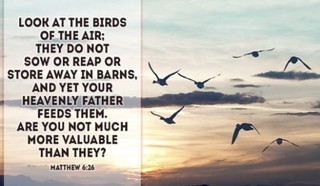
- Recent Translations
- All Translations
Mǎtaìfúyīn 6:26
Share
Settings
Mǎtaìfúyīn 6:26 Meaning and Commentary
Behold the fowls of the air
Not such as are brought up in houses, but which fly abroad in the air, wild; and are not supported by their own, or any human care, but by the care of God: ( Luke 12:24 ) particularly mentions the "ravens", referring probably to ( Psalms 147:9 ) , and because they are very voracious creatures: and there it is said, "consider the ravens"; look attentively upon them, and with observation,
for they sow not, neither do they reap, nor gather into barns.
This is not said, that men should not sow, nor reap, nor gather into barns: but to reprove their diffidence and unbelief: who, though they have the opportunity of sowing, reaping, and gathering in, year by year, yet distrust the providence of God; when the fowls of the air do none of these,
yet your heavenly Father feedeth them;
see ( Psalms 145:15 Psalms 145:16 ) ( 147:9 ) . The Jews acknowledge this, that the least and meanest of creatures are fed by God.
``Mar says F3, the holy blessed God sits (Nzw) , "and feeds", i.e. all creatures, and takes care of them.''Are ye not much better than they?
Do not you differ from them? are ye not much more excellent than they? And if God feeds and provides for inferior creatures, such as are very mean and contemptible, how much more will he not provide for you? There is a passage in the Talmud, which has great affinity to this of Christ's, and appears to have in it pretty much of the like kind of reasoning. In the Misna
F4 it is said, that R. Simeon ben Eleazer should say,
``Did you ever see a beast, or a fowl, that had a trade? but they are fed without trouble.''In the Gemara F5 is added,
``Did you ever see a lion bearing burdens, an hart gathering summer fruits, a fox a money changer, or a wolf selling pots? And yet (reu alb Nyonrptm) , "they are nourished without labour", and wherefore are they created? To serve me, and I am created to serve my Maker: and lo! these things have in them an argument, "from the less to the greater"; for if these, which are created to serve me after this manner, are supported without trouble; I, who am created to serve my Maker, is it not fit that I should be supplied without trouble? And what is the reason that I am sustained with trouble? My sins.''
F3 T. Bab. Sabbat, fol. 107. 2. Avoda Zara, fol. 3. 2.
F4 Kiddushin, c. 4. sect. 14.
F5 T. Hieros. Kiddushin, fol. 66. 2. Vid. T. Bab. Kiddushin, fol. 82. 1, 2.


